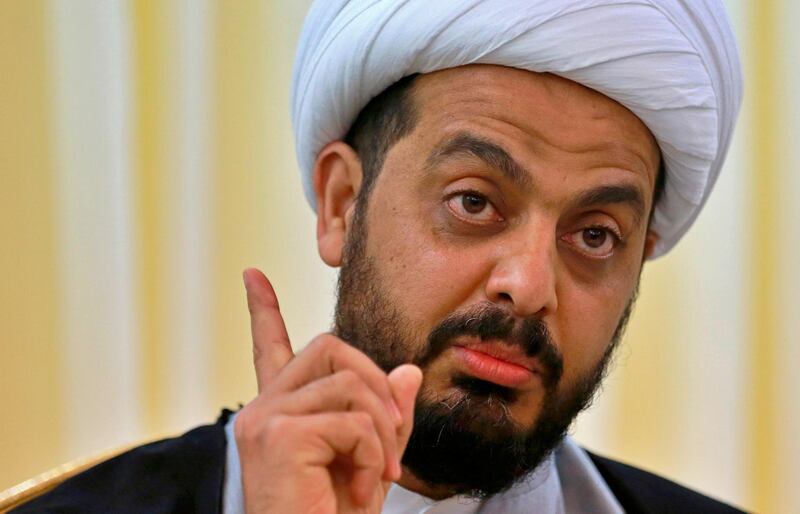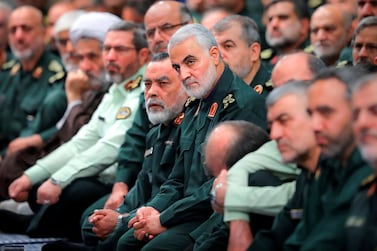The leader of a powerful Iraqi militia denied on Tuesday that his forces played any role in the death of anti-government protesters.
Iraq has been rocked by demonstrations against the country's political elite for more than two months.
Protesters are calling for sweeping political reforms and the end of Iran's influence in Iraqi affairs.
At least 400 people have died at the hands of security forces firing live ammunition and tear gas to disperse the demonstrations.
Qais Khazali, head of Asaib Ahl Al Haq, an Iranian-backed armed militia, denied having any links to the killings.
"We regret that accusations against us are continuous, but nevertheless, since the protests started some of our members have been attacked and killed in vicious ways," Mr Khazali told the British broadcaster the BBC on Tuesday evening.
Iranian-backed militias have been accused of deploying snipers on Baghdad rooftops during the deadly protests, but Mr Khazali denied the accusations.
“Everyone in Iraq knows that we have not participated in any aggression during the demonstrations,” he said, adding that members of his group reported any “misconduct” to the judiciary.
They sometimes operate in conjunction with Iraqi security forces but they retain their own command structures.
Iran-backed armed groups and politicians have dominated Iraq’s state institutions since a US-led invasion in 2003 that toppled dictator Saddam Hussein, plunging the country into years of civil war and decimating its infrastructure.
But Mr Khazali denied that Tehran has any role played in Baghdad's internal affairs, despite leaked intelligence reports released by the The New York Times and The Intercept last month detailing how Tehran holds sway over its neighbour.
“Everyone knows that Iran is neighbouring state of Iraq and has a strategic dimension in the political and social aspect of the country,” he said.
But “these accusations about the extent of our relations are untrue,” he continued.
The killings are another reminder of Tehran’s reach in Iraq, where a sizable number of former militia commanders are now members of parliament and support the Iranian agenda.
“We are Iraqis, this is our country that we have fought for and protected from ISIS. We took these actions ourselves and not on behalf of Iran,” Mr Khazali said, adding that his militias do not allow any external actors to interfere with their affairs.
What unites Iraq with Iran is the Israeli issue, he stressed.
“We need to clarify a matter, that those who say there tensions between the US and Iran in Iraq are wrong, the truth is the issue is an Israeli problem,” he said.
Iraq has always stood with its Arab nations and Iran in backing the Palestinian cause, he said, adding that Baghdad “had always held this position.”
“We should not underestimate the role that Israel is playing to de-stabilise the region,” he said.
But the US this month sanctioned Iraqi militia leaders who are close to Iran and are accused of heavy involvement in the crackdown.
Mr Khazali and his brother Laith Khazali were the prime targets of the santions as well as Hussain Falih Aziz Al Lami, who was accused of running a militia on behalf of Iran's Islamic Revolutionary Guard Corps.
Tensions between Washington and Tehran heightened after the US imposed economic sanctions to compel Iran to halt its military presence in the region and limit its nuclear activities.
Secretary of State Mike Pompeo blamed Iran this week for a spate of rocket attacks against Iraqi bases where American troops are located.
He warned Tehran that President Donald Trump's administration would respond forcefully if US or allied forces were injured or killed.
The attacks have increased in recent months against bases where US forces are present in Iraq.
Mr Khazali also denied that the head of the Islamic Revolutionary Guard Corps, Qassem Soleimani , has had any interference in Baghdad’s political realm.
General Soleimani is known to be Tehran's point man on Iraq and travels there frequently during times of political turmoil.
The intelligence documents leaked by the New York Times and The Intercept showed that General Soleimani was seen in Iraq after the protests kicked off.
He chaired various meetings to persuade allies in the Iraqi parliament to help Prime Minister Adel Abdul Mahdi to hold on to his role.







